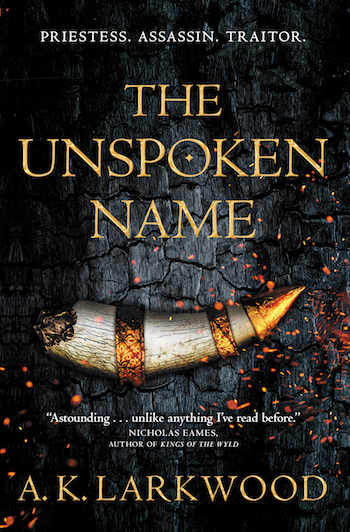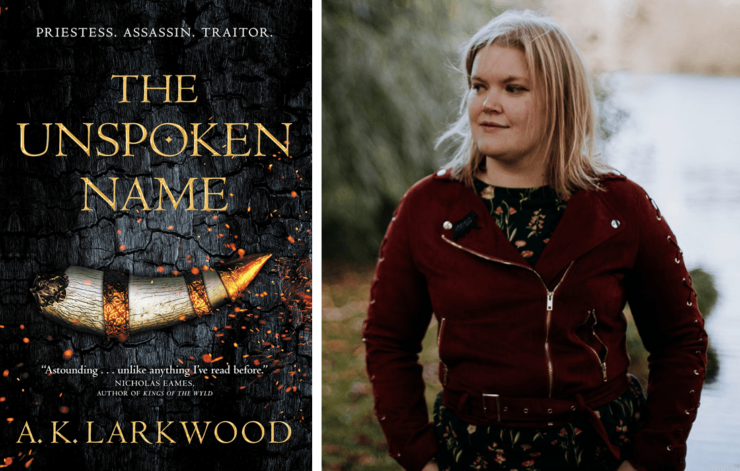A.K. Larkwood—author of The Unspoken Name—dropped by r/Fantasy for an AMA, where she talked orc inspirations, the writerly life, cooking, food writing, the sequel, D&D, writing secrets, tusk trauma, and much more. Check out the highlights below, and read the first six chapters of The Unspoken Name here!
On why she made her main character, Csorwe, an orc:
Well, I saw the Lord of the Rings movies as a tween like everyone else and I immediately went home and started inventing a goblin language, so I’ve probably always been this nerd.
That said, for me the whole point of fantasy is to get another angle on things that are ‘supposed’ to be inhuman. A lot of classic speculative literature contains humanity within a very specific closed field and whatever lies outside that margin is monstrous by definition—gross, ugly, villainous, abnormal. Queer people, people of colour, disabled and mentally ill people have been treated especially badly by the genre, I think because so much of what we are interested in in fantasy and science fiction is strangeness. There is a fascination with what is other than normative, which unfortunately often manifests as horror and repulsion—peering over the walls just to reinforce them.
The genre has obviously moved on. Our understanding of what it is to be human continues to expand, as it should. As a queer woman I’m glad to be considered a human being. But I’m still interested in those margins. I’m interested in what it feels like to inhabit strangeness, in what lies outside our understanding.
Of course this is all pretty academic when it comes to the book itself, in which the Oshaaru (orcs) are one culture among many and not especially alienated. Csorwe’s outsider status is down to her personal history more than her cultural background. But that’s where it originally came from, I think. I wanted to write a fantasy world where humans were not the baseline, because I’m bored of seeing baseline humanity meaning a very specific thing.
Also, tusks are cool.
On Csorwe’s theme song:
A close tie between TV on the Radio’s ‘Trouble’ and Miya Folick’s ‘Talking With Strangers’.
I also think of her whenever I hear Bob Dylan’s ‘Man in the Long Black Coat’.
On how she’d describe The Unspoken Name:
Thinking about what inspired me, I guess something like—The Tombs of Atuan meets The Lies of Locke Lamora, with a little bit of space opera thrown in??
On orc society:
Fun fact—the word “orc” is never actually used in the book (nor is “elf”, “human”, etc). In-universe, Csorwe’s people are Oshaaru. I tend to worldbuild on the fly, so I’m afraid I don’t have an encyclopedia of bonus world information at my fingertips—but maybe one day I’ll write something set in the Oshaarun Territories and we’ll learn something about what life is like there.
On the inspiration for Csorwe’s wizard mentor, Sethennai:
The inspiration for Sethennai actually came from Wolf Hall by Hilary Mantel. One of the things I enjoyed most about that book was the relationship between the main character, Cromwell, and his charismatic boss and mentor, Cardinal Wolsey. At the time I read it, I was settling into my first real job and thinking a lot about the dynamics we have with the people we work with and for—they can be almost as complex as family relationships in the sense that you’re bound to these people by certain common experiences whether you like them or not, they’re hierarchical, there is tremendous scope for rivalry and loyalty and misuse of power. So I knew I wanted to write a book about someone’s loyalty to their questionably deserving boss.
On her D&D class:
I usually play a rogue in D&D for escapist reasons—in real life my dex stat is very lacking so it’s fun to pretend to be nimble. In real life I’d probably be a squishy wizard or cleric.
On her recent favorite books:
Some of my favourites of the past few years include—Gideon the Ninth by Tamsyn Muir, Jade City and Jade War by Fonda Lee, Yoon Ha Lee’s Machineries of Empire trilogy, Rosewater by Tade Thompson, Annihilation by Jeff VanderMeer, and Robert Jackson Bennett’s Divine Cities trilogy.
I’m really looking forward to She Who Became the Sun by Shelley Parker-Chan. I had the opportunity to read an ARC and it’s just gorgeous, brutal and funny—highly recommend. Also look out for Nghi Vo’s The Empress of Salt and Fortune, Emily Tesh’s Drowned Country and Everina Maxwell’s Winter’s Orbit.
Buy the Book


The Unspoken Name
On her one secret to writing that no one knows about:
Now let me tell you, if I knew the one special secret to writing I would not go telling just anyone—
—no but it’s writing in the notes app on your phone, though. It tricks your brain into thinking it’s not “real” writing so you can just do it and you don’t worry about whether it’s good. Also, handy for the bus.
On her writerly origin story:
I’ve wanted to be a writer I think since I figured out that books were written by a person and didn’t just materialise from the ether. My first serious attempt at a fantasy novel was when I was 9 or 10: “The Quest Of Orn” dealt with the struggles of two plucky kids called Jack and Gretel as they attempted to foil the schemes of the Dark Emporer.
On why she loves writing about food:
I love writing about food because it’s so bound up with lots of other things I find interesting to write about—comfort, status, history, physicality, luxury, memory—and also because there is so much lavish sensory detail to describe and goodness knows I like to go on about colour and texture for six paragraphs.
Unfortunately I handle it the same way I handle all worldbuilding: I go with whatever seems cool at the time and find a way to justify it in retrospect. Usually it’s down to whatever food I feel like eating at the time. This was definitely the case with the steamed buns.
Sometimes, as with mealworms, I did want to think a bit about what kind of food you’d end up eating if you lived on a station in the middle of nowhere, where fresh food might be hard to come by. Lots of preserves, insects which can be farmed in little space, and so on.
…
The breakfast Csorwe cooks in one of the early chapters is based on something I sometimes make at home for lunch. You caramelise a handful of diced onion in butter, add salt and pepper, break in an egg or two, and stir gently over heat until it’s as set as you prefer it. If you’re feeling fancy you can whisk the broken eggs with a teaspoon each of soy sauce and mirin before cooking. Good with rice.
On the sequel:
The whole gang is back, one way or another.
I’m still deep in the process of revising it, so I have to be irritatingly vague and mysterious, but I can inform you it has:
- more Tal
- more snakes
- more duels










